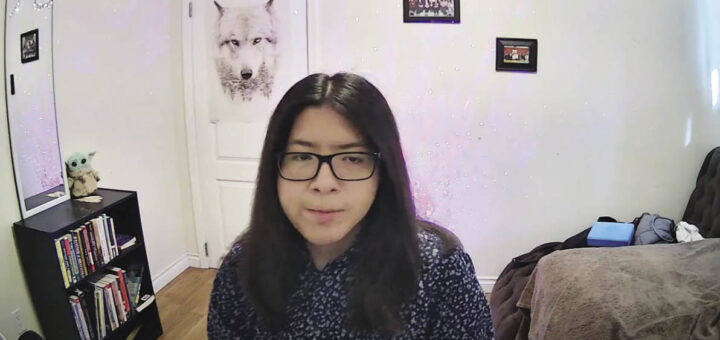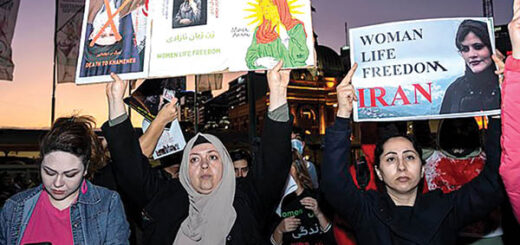Inaugural SAMRU anti-racism event invites BIPOC students to share experiences

By Noel Harper, News Editor
When Alannah Providence-Toho began her studies at Mount Royal University (MRU), she attended a class in which a discussion about Inuit peoples took place. The professor, Providence-Toho said, referred to the community by a racial slur.
“I was shocked that it came from a professor, and it bothered me because no one said anything,” she said, adding that she later reached out to the professor to inform her of the incorrect term she used, who was receptive, but seemed reluctant to change.
“In her defense, that’s one of the terms she knows. The only term, actually.”
Providence-Toho, a member of the Dene Tha’ First Nation and fourth-year Bachelor of Child Studies student, was one of several speakers who shared their stories during ‘The Loudest Silence: Anti-Racism Commemoration Open Mic’, put on by the Students Association of Mount Royal University (SAMRU).
The inaugural event, hosted by SAMRU President Spirit River Striped Wolf, brought students, faculty and staff together to listen to the experiences of BIPOC (Black, Indigenous, people of colour) community members. Ten student speakers gave presentations to the virtual audience. Representatives of MRU’s leadership, faculty association and staff association spoke as well.
“[Students] will present poetry, spoken word, music, and a part of themselves,” said Striped Wolf, introducing the open mic.
“I feel really strongly that safe spaces for dialogue, and a building of awareness and understanding of each other, are truly critical elements of Mount Royal’s continued growth and education,” said Phil Warsaba, MRU’s vice-provost and associate vice-president of students, an observer of the event.
Diamond Reid talked about the lack of spaces in her life in which, conversations about race take place, including home, school and MRU itself.
“My apparent racial ambiguity has confused people, made them uncomfortable even. I’ve been a puzzle that people have wanted to find the colour in, and this gave me a certain level of guilt-covered camouflage,” Reid said.
She continued to discuss the various instances when she wanted to speak up against what she saw and experienced on campus, such as an absence of BIPOC faculty to discuss provincial affairs, and professors who dismissed land acknowledgements as “anti-professional” or decreed out-of-date terms correct because they were written in policy.
“I didn’t know where I fit into the conversation,” said Reid.
Tala Abu Hayyaneh, a recent SAMRU council candidate, brought up the origins of her name and how it is often misinterpreted — and when this happens, she is told her name is “unusual” and that she shouldn’t take offense to its mispronunciation.
“My name … is my story. It is the fact that I wrote this speech today in Arabic before I wrote it in English. It is the fact that I speak in English, but my mind speaks in Arabic,” she said.
“If I can perform so well with a bilingual mind … then so can you simply ask me how you should pronounce my name and address me correctly.”
Other students told their stories through various forms of art. Courtney Vital shared examples of bead work she had completed, a metaphor for wanting increased representation of Indigenous culture at MRU, while Joe Plant presented a song called ‘The Cliff’ about yearning to find one’s identity.
The afternoon’s final student speaker was Camille Rhose Tabacla. While serving as SAMRU’s current VP of student affairs, Tabacla said she would remove herself from the position and speak solely as a student.
“I was so ecstatic when I saw the MRU slogan was ‘You Belong Here’,” said Tabacla, who selected the university as her only post-secondary choice following high school — during which she was bullied for the colour of her skin and expressing her culture.
“Now imagine how I felt when I sat in my very first MRU class … when the professor laughed at my last name, and did not want to call me by that. And when I corrected him, he asked how you say it in Canada,” she continued, recounting the experience in a poem titled ‘We Are Not All The Same’.
“Thank you for listening to what we have to say now, but this is just the start,” Tabacla added.
Striped Wolf ended the event by reflecting on his role within the student’s association and how every student can continue to better themselves.
“We can all be problematic and experience some form of discrimination in our lives. It is human to bump into walls. As human beings, we are flawed creatures who are prone to make mistakes — it is in our very nature,” he said.
Another event observer, Lee Easton, president of the Mount Royal Faculty Association, remarked that, “What we’ve heard here is the effects of overwriting, erasing, ignoring … the knowledge that Indigenous peoples have and have had for millennia, and we need to really work on that.”
“We could start on a much more accessible level, and that would just be remembering respectful relationships start with recognizing names,” Easton said.




